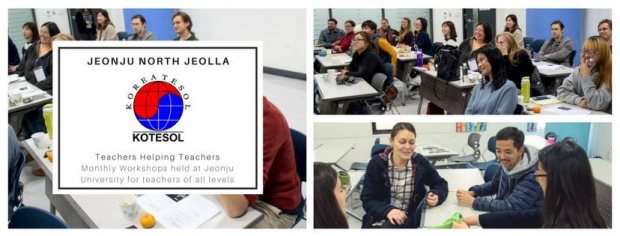
The new school year is coming up... Are you ready?
Jeonju North Jeolla KoTESOL has prepared two helpful presentations to get our year off to a good start. Local teacher Sam Costa will talk about handling student behaviour and developing classroom management skills. The second presentation, by university instructor Rachel Barker, will show us how to include assessment as part of the learning experience.
Join us on Saturday, March 16th for a friendly afternoon of networking and professional development. An informal dinner will follow the workshop for those interested.
Classroom Management Skills: Understanding and Reacting to Student Behavior
One of the biggest challenges of teaching, especially for new teachers, is dealing with the behavior of your students. Each student is different and brings with them different motivations for their actions and reactions to different stimuli. Whether it is something you as their teacher did to make them act a certain way, or whether something else in their environment has had an influence on their actions, there is almost always a concrete reason for why a student is acting out. Navigating this sea of clashing personalities and redirecting your student's energy back to constructive learning can be difficult at times.
Drawing from my TESOL training as well as personal experience, this presentation will discuss common patterns and reasoning behind student behavior, tips on how to prevent or reduce the severity of less than desirable behavior in your classroom, and strategies for dealing with and redirecting bad behavior when it does occur. Recognizing and acting on the cues your students give you before they choose to act out is key and depending on the age, level, and personality of the student, these cues can manifest themselves in different forms.
Overall, students need to feel as though they can trust their teacher and that their teacher is taking their feelings into account. If they feel they are in a relatively comfortable environment, if they have a sufficient outlet for their energy, and if they believe they are not wasting their time in your class, instances of poor behavior should be few and far between.
Bio: Samuel Costa is originally from Long Island New York. He graduated with a B.A. in Linguistics with a minor in Korean studies and an M.A. in TESOL from Stony Brook University. He has taught English in Korea to elementary and middle school children for three and a half years in both public school and private academy settings. He also spent the majority of his university years tutoring and acting as a TA for foreign exchange university students. His research interest in linguistics, specifically phonetics and morphology, has helped keep his passion for teaching alive and has given him insight into how foreign language learners acquire language. He genuinely enjoys teaching and spends a lot of time thinking about ways to improve.
Assessment for Learning: assessment as a tool, not an end point.
With the landscape of assessments ever changing, from absolutely none, to too many, it is important to take a look at why assessment can be useful and how it can help teachers and learners. Assessment for Learning has been well established in the UK for almost 30 years, and yet the general mood of progressive education research is to move away from formal assessment. Assessment for Learning forms a middle ground where, in a system which demands assessment, how can we make it useful to the learner and learning facilitator? During this workshop, teachers will have the opportunity to explore different types of assessment and ways of making them more effective as a learning tool, instead of a destination for learning. Feedback will also be examined and reflected upon as well as the critical application of Assessment for Learning techniques within the Korean cultural context.
Bio: Rachel Barker has been teaching in Asia for the last 10 years. She started her TESOL career in Changwon, South Korea in a hagwon and then in the public after-school programs. She then worked in Malaysia with newly graduated university students from Limkokwing University before returning to Changwon, in a public elementary school. Rachel moved to Myanmar in 2014 where she taught Language Arts and Science at an International school. Phetchaburi Rajabhat University, Thailand is where Rachel completed her Master’s research on Motivation and the L2 Self System and she taught there for two years. Returning to Korea in 2018, Rachel is currently working at Chonbuk National University in the in-service teacher training program. Her main teaching interests focus around motivation and acquisition.


